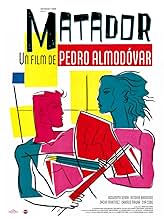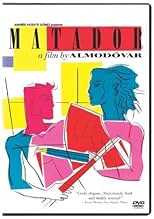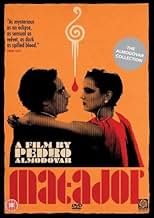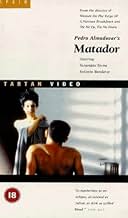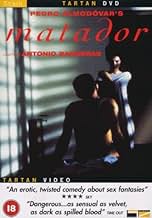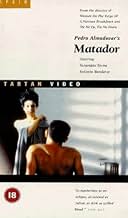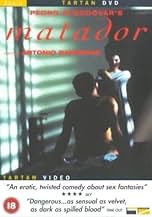CALIFICACIÓN DE IMDb
6.9/10
14 k
TU CALIFICACIÓN
Un matador es herido por un toro y debe retirarse de las corridas. Solo uno de los problemas de uno de los personajes que chocan inesperadamente en este título.Un matador es herido por un toro y debe retirarse de las corridas. Solo uno de los problemas de uno de los personajes que chocan inesperadamente en este título.Un matador es herido por un toro y debe retirarse de las corridas. Solo uno de los problemas de uno de los personajes que chocan inesperadamente en este título.
- Dirección
- Guionistas
- Elenco
- Premios
- 6 premios ganados y 7 nominaciones en total
Nacho Martínez
- Diego
- (as Nacho Martinez)
Bibiana Fernández
- Vendedora Flores
- (as Bibi Andersen)
Verónica Forqué
- Periodista
- (as Veronica Forque)
Mercedes Jiménez
- Alumna 3ª
- (as Mercedes Jimenez)
Francesca Prandi
- Alumna 4ª
- (as Francesca Romana)
Opiniones destacadas
It is very much worth watching this early film of Almodovar from 1986, with a painfully young Antonio Banderas also at one of his first major screen presences. As many of his latest great movies it's a film hard to put in a precise square, a combination of comedy and tragedy, of crime, love and corrida movie with a touch of absurd and a touch of passion taken directly from life.
Although many of the major themes of passion, sexual desire and ambiguity, relation between love and death are already present the movie is somehow simpler in action and easier to watch than some of the later films. The story of two sexual predators and murderers, united in life by the passion for bull fights and in death by their passion for each other is acted with accuracy by a good team of actors and directed with an already recognizable style by Almodovar. The hand of the young master is certainly already there, and the film ages well 20 years after is premiere.
Although many of the major themes of passion, sexual desire and ambiguity, relation between love and death are already present the movie is somehow simpler in action and easier to watch than some of the later films. The story of two sexual predators and murderers, united in life by the passion for bull fights and in death by their passion for each other is acted with accuracy by a good team of actors and directed with an already recognizable style by Almodovar. The hand of the young master is certainly already there, and the film ages well 20 years after is premiere.
Before I saw this movie in late 80-s I knew something about culture, tradition and 'spirit' of Spain, the country which inspired me for years. This movie made an enormous impression on me as it gave me very deep insight into 'real Spanish spirit', i.e. what does death mean to Spanish people in the light if their tradition and culture.
The personality of ex-matador and his behaviour underlined by his words - 'to stop to kill means to dye for me', on the other hand a high class woman being 'infected' with death, treating Diego as her God of Death, and these two 'lost worlds' slowly approaching each other into a fatal bitter end, which was filled with the most beautiful tune ever made (Esperame en el cielo mi corazon...) all this creates an unforgettable and distinctive impression after watching this movie.
Pedro Almodovar you gave us a great piece of art, I believe there are some more pictures that you can bring to us in the future.
Thanks Pedro..............
The personality of ex-matador and his behaviour underlined by his words - 'to stop to kill means to dye for me', on the other hand a high class woman being 'infected' with death, treating Diego as her God of Death, and these two 'lost worlds' slowly approaching each other into a fatal bitter end, which was filled with the most beautiful tune ever made (Esperame en el cielo mi corazon...) all this creates an unforgettable and distinctive impression after watching this movie.
Pedro Almodovar you gave us a great piece of art, I believe there are some more pictures that you can bring to us in the future.
Thanks Pedro..............
This 5th feature of Almodovar is one of his best (along with Labyrinth of passion & Kika) as far as I am concerned, and if not his best then for sure his most provocative flms. As usual, Almodovar explores some of the darkest sides of human sexuality, and deals with perversity as dealing with any every-day life subject.
For once more, the notorious film-maker, at great shape, entertains with his trademark raving, hilarious, politically incorrect dialogs, pace and style and while dealing with dark (necrophilia) or serious (religious oppression) subject matters, it manages to be very funny and entertaining. What's great with Almodovar is that you simply CANNOT label his films. Is it comedy? nope. Is a thriller? nope. Is it a crime film? nope. This is Almodovar, so all pretenders go see another million dollar US product . But to all the admirers of unique and original films, this is definitely recommended, if you can tolerate with some weird humour, a bit sexy visuals and nudity and some violence. Matador is ART!
For once more, the notorious film-maker, at great shape, entertains with his trademark raving, hilarious, politically incorrect dialogs, pace and style and while dealing with dark (necrophilia) or serious (religious oppression) subject matters, it manages to be very funny and entertaining. What's great with Almodovar is that you simply CANNOT label his films. Is it comedy? nope. Is a thriller? nope. Is it a crime film? nope. This is Almodovar, so all pretenders go see another million dollar US product . But to all the admirers of unique and original films, this is definitely recommended, if you can tolerate with some weird humour, a bit sexy visuals and nudity and some violence. Matador is ART!
I am not sure what to expect when the opening scene is a man masturbating to torture porn, a term that was probably not even invented in 1988.
From there we go to alternating clips of Antonio Banderas asking the ex-bullfighter Nacho Martínez about women and he compares getting a woman to bullfighting, while we watch someone do exactly that. We are no, of course, prepared for the necrophilia twist in that encounter.
We find our boy, Antonio, and he is a boy in this film, in a strict Catholic household. I would have to guess that his mother was Opus Dei. He attempts to rape his neighbor and confesses to four murders which we know he did not do. This is just Almodóvar's take on religion and repression. He revisits that subjects again in the film, so it must me a theme for him.
But, then the story shifts to Nacho and Assumpta Serna, with Eva Cobo in a minor role. This is where the story gets interesting with the police trying to solve the four murders and the real murderers trying to lay it on Antonio.
It gets bizarre at the end with Antonio seeing the killers in his mind and leading the police to them. But, they arrive too late as the climax of sex and death occurs simultaneous with an eclipse. How weird is that?
From there we go to alternating clips of Antonio Banderas asking the ex-bullfighter Nacho Martínez about women and he compares getting a woman to bullfighting, while we watch someone do exactly that. We are no, of course, prepared for the necrophilia twist in that encounter.
We find our boy, Antonio, and he is a boy in this film, in a strict Catholic household. I would have to guess that his mother was Opus Dei. He attempts to rape his neighbor and confesses to four murders which we know he did not do. This is just Almodóvar's take on religion and repression. He revisits that subjects again in the film, so it must me a theme for him.
But, then the story shifts to Nacho and Assumpta Serna, with Eva Cobo in a minor role. This is where the story gets interesting with the police trying to solve the four murders and the real murderers trying to lay it on Antonio.
It gets bizarre at the end with Antonio seeing the killers in his mind and leading the police to them. But, they arrive too late as the climax of sex and death occurs simultaneous with an eclipse. How weird is that?
Essentially seen by many as a warped sex fantasy that uses the codes and conventions of the detective thriller to disguise a darker, more psychological film about the wayward perversions and sinister desires of a seemingly affluent area of contemporary Madrid; Matador (1986) can also be seen as a not-so-subtle comment on the nature of modern-day relationships, aspirations and obsessions in a meta-textual form that makes continual use of its titular, bullfighting motif. Although it does have some slight thematic problems, particularly in terms of the overall tone of the film and eventual motivation of the characters, it is, nonetheless, one of Almodóvar's most interesting and perplexing films of this particular period; featuring a refinement of many of his earliest interests and characteristics from films like Dark Habits (1983) and What Have I Done to Deserve This? (1984), as well as being the film that signalled the move into the second phase of his career.
As the implications of the title would suggest, the film's narrative is bolstered by numerous references, both spoken and visual, to the obvious role-play and iconography of the bullfight. It is also a film about violence, and the sexuality of violence; an uncomfortable idea that is reinforced by the film's provocative opening sequence, in which we find the central matador of the title, Diego Montes, masturbating to violent scenes of exploitation cinema. The scene establishes the nature of the matador, both as a character and as a social phenomenon, as well as introducing the link between sex and death that will come to form an important thematic strand to the narrative. As the story progresses, the mechanisms of the drama conspire to throw together two separate characters that come to complement the unspoken desires and murderous lust that they seemingly share with one another, with the eventual courtship and inevitable seduction presented by the director as a surrogate bullfight in its self.
Where the film falls apart slightly is in the presentation of the character played by Antonio Banderas, a hyper-sensitive, implied homosexual who idolises the matador to the extent that he actually attempts to rape his young, fashion-model girlfriend (an act that eventually leads him to confess to a string of serial killings as a result of his mother's enforced, catholic guilt). It is a complex character, impeccably performed by the young Banderas, but his appearance ultimately sends the film off on a tangent that detracts from the central crux of the drama. Though the inclusion of this subplot does allow Almodóvar the chance to make a satirical comment on the nature of everything from fashion, to religion, sexuality, etc, these themes often feel like they've been handpicked from a completely different film, not always complimenting the central story, and too often leading it in directions that in the end feel unfinished or slightly unformed. Many of these loose ends can be glossed over, while some (the last minute implication of "second sight" as suggested by a solar eclipse) really seem to come out of leftfield.
Nevertheless, these are minor criticisms that don't necessarily destroy the ultimate intentions of the film - which really only become clear in the final scene - or the fantastic direction of Almodóvar and the performances of his cast. Although Matador certainly has its flaws (not to mention its detractors), it is, in my opinion, a fine little film and one of Almodóvar's most original and audacious creations. The performances are all incredibly committed, including the central pairing of Assumpta Serna and the late Nacho Martínez, as well the fine support from Banderas, the gorgeous Eva Cobo and Almodóvar regulars Carman Maura and Eusebio Poncela; whilst the central idea behind the script and the bold stokes of the director's intuitive grasp of the various film-making processes further refines and develops a number of themes that have come to be at the forefront of Almodóvar's career for the last twenty-five years.
As the implications of the title would suggest, the film's narrative is bolstered by numerous references, both spoken and visual, to the obvious role-play and iconography of the bullfight. It is also a film about violence, and the sexuality of violence; an uncomfortable idea that is reinforced by the film's provocative opening sequence, in which we find the central matador of the title, Diego Montes, masturbating to violent scenes of exploitation cinema. The scene establishes the nature of the matador, both as a character and as a social phenomenon, as well as introducing the link between sex and death that will come to form an important thematic strand to the narrative. As the story progresses, the mechanisms of the drama conspire to throw together two separate characters that come to complement the unspoken desires and murderous lust that they seemingly share with one another, with the eventual courtship and inevitable seduction presented by the director as a surrogate bullfight in its self.
Where the film falls apart slightly is in the presentation of the character played by Antonio Banderas, a hyper-sensitive, implied homosexual who idolises the matador to the extent that he actually attempts to rape his young, fashion-model girlfriend (an act that eventually leads him to confess to a string of serial killings as a result of his mother's enforced, catholic guilt). It is a complex character, impeccably performed by the young Banderas, but his appearance ultimately sends the film off on a tangent that detracts from the central crux of the drama. Though the inclusion of this subplot does allow Almodóvar the chance to make a satirical comment on the nature of everything from fashion, to religion, sexuality, etc, these themes often feel like they've been handpicked from a completely different film, not always complimenting the central story, and too often leading it in directions that in the end feel unfinished or slightly unformed. Many of these loose ends can be glossed over, while some (the last minute implication of "second sight" as suggested by a solar eclipse) really seem to come out of leftfield.
Nevertheless, these are minor criticisms that don't necessarily destroy the ultimate intentions of the film - which really only become clear in the final scene - or the fantastic direction of Almodóvar and the performances of his cast. Although Matador certainly has its flaws (not to mention its detractors), it is, in my opinion, a fine little film and one of Almodóvar's most original and audacious creations. The performances are all incredibly committed, including the central pairing of Assumpta Serna and the late Nacho Martínez, as well the fine support from Banderas, the gorgeous Eva Cobo and Almodóvar regulars Carman Maura and Eusebio Poncela; whilst the central idea behind the script and the bold stokes of the director's intuitive grasp of the various film-making processes further refines and develops a number of themes that have come to be at the forefront of Almodóvar's career for the last twenty-five years.
¿Sabías que…?
- TriviaOne of the films that Diego Montes is masturbating to in the Opening Sequence is Mario Bava's 6 mujeres para el asesino (1964).
- Citas
Francisco Montesinos: I've told you not to shoot up in the dressing rooms!
- ConexionesFeatured in Playboy: The Story of X (1998)
Selecciones populares
Inicia sesión para calificar y agrega a la lista de videos para obtener recomendaciones personalizadas
2025 Venice Film Festival Guide
2025 Venice Film Festival Guide
See the full lineup for the 2025 Venice Film Festival, taking place Aug. 27 – Sept. 9, 2025.
- How long is Matador?Con tecnología de Alexa
Detalles
- Fecha de lanzamiento
- País de origen
- Sitios oficiales
- Idioma
- También se conoce como
- 鬥牛士
- Locaciones de filmación
- Viaducto de Segovia, Madrid, España(Bridge where Maria and Diego talk.)
- Productoras
- Ver más créditos de la compañía en IMDbPro
Taquilla
- Total en EE. UU. y Canadá
- USD 279,394
- Fin de semana de estreno en EE. UU. y Canadá
- USD 13,399
- 13 ago 2006
- Total a nivel mundial
- USD 286,126
Contribuir a esta página
Sugiere una edición o agrega el contenido que falta

